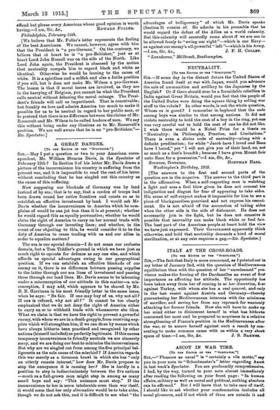NEUTRALITY.
[To raa Earroa or ram ..SraCTLInn"] S18.--If some day in the distant future the United States of America found itself at war with Japan, would you advocate the sale of ammunition and artillery to the Japanese by the English? Or if there should ever be a formidable rebellion is India against Great Britain, would you feel that the people of the United States were doing the square thing by selling sac stuff to the rebels ? In other words, is not the whole question. Whose ox is gored? I remember in boyhood that the code among boys was similar to that among nations. It did net violate neutrality to hold the coat of a boy in the ring, yet one was very careful not to hold the coat of one he did not like. I wish there would be a Nobel Prize for a theais on "Neutrality: its Philosophy, Practice, and Limitation." There is even a divine code of neutrality—along with a definite predilection; for while "Jacob have I loved and Esau have I bated," yet "I will not give you of their land, no, not so much as a foot's breadth ; because I have given Mount Seir unto Esau for a possession."—I am, Sir, &a, [The answers to the first and second parts of the question are in the negative. The answer to the third part is in the affirmative. When a self-respecting man is watching a fight and sees a foul blow given he does not conceal hie indignation and disgust for fear of appearing to take side. His sense of self-respect makes it impossible for him to see • piece of blackguardism practised and not express his resent- ment Ile is not afraid of the accusation of taking sides when the other side is the side of dishonour. He does not necessarily join in the fight, but be does not conceive it possible that neutrality can make black white or foul fair. The best part of the American people at heart hold the view we have just expressed. Their Government apparently think otherwise, and hold that neutrality demands a kind of moral sterilization, or at any rate requires a gag.—ED. Spectator.]


































 Previous page
Previous page